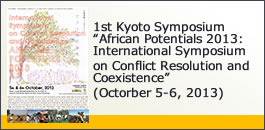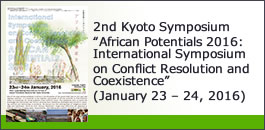[5th Public Workshop / 1st Meeting of West Africa Research Cluster] (February 15, 2012)
Date: February 15, 2012
Venue: Inamori Foundation Memorial Bldg. (Inamori Center), Middle-sized Meeting Room, Kyoto University
Program
“Nigeria: The Post-Amnesty Blues and the Future of Insurgency in the Niger Delta”
Dr. Abdul Raufu Mustapha (Oxford University)
“Boko Haram: The Long Road to Islamic Terrorism”
Dr. Charles Ukeje(Obáfẹmi Awólọwọ University)
Abstract
“Nigeria: The Post-Amnesty Blues and the Future of Insurgency in the Niger Delta”
Dr. Charles Ukeje(Obáfẹmi Awólọwọ University)
Despite its huge hydrocarbon resources, popular struggle to draw attention to the myriad developmental challenges facing the oil region of Nigeria entered a ferocious and vicious phase from the mid-1990s with the emergence of a plethora of armed groups with access to sophisticated weapons and the capability to cripple oil production and undermine national security. These groups launched daring attacks on oil installations, kidnapped oil worker (and also notable individuals), and vandalised oil infrastructure. By 2008-2009, their exploits had crippled oil production to about one-thirds of the country’s daily output of 2.4million barrels.
This was the backdrop against which the Yar’Adua administration, only two years in the saddle, announced presidential amnesty to those involved in perpetrating the heinous crimes if they surrendered their weapons and denounced violence within the 60-day grace period stipulated, starting from June 25, 2009. The government also promised to put the ex-militants, as they are popularly known, into rehabilitation and vocational training schemes that would enhance their seemless re-integration into productive community life.
More than two years after the Amnesty Proclamation, there is enough objective basis to evaluate the post-amnesty achievements and shortcomings, if any, along with the prospects for the future. What, for instance, has happened to the ex-militants in the post-amnesty period? What structures of incentive have been put in place by the government to drive what is widely touted to be an ambitious, even grandiose, idea? And, to what extent have the ex-militants taken advantage of the post-amnesty opportunities? Whereas the post-amnesty phase drastically reduced the spate and intensity of insurgent attacks, to what extent can it pave the way for durable peace and sustainable development in the Niger Delta? Is the amnesty, in fact, not another contrived short-cut to peace in Nigeria’s Delta? What is the role of critical stakeholders, including spoilers, vis-a-vis the implementation of the post-amnesty priorities? Finally, what are the alternative futures for the State, oil companies and local communities in the post-amnesty era; especially against the background of recent developments in the still largely impoverished and volatile oil region?
“Boko Haram: The long road to Islamic Terrorism”
Dr. Abdul Raufu Mustapha (Oxford University)
Since 2009, Nigeria has been rocked by a wave of Islamist insurgency, ostensibly led by the Boko Haram group. According to Human Rights Watch, over 260 people were killed in numerous attacks in January 2012 alone. Predictably, numerous arguments and theories have been advanced to explain the phenomenon of Boko Haram. From conspiracy theories to historical reconstructions, we are faced with numerous and conflicting explanations of a phenomenon that continues to extract a toll in lives and limbs. In this presentation, I address three key questions: Who are Boko Haram? What do they want? How best can Nigeria and the international community address the challenge posed by the organization?
[1st Meeting of West Africa Research Cluster / 5th Public Workshop] (February 15, 2012)
Date: February 15, 2012
Venue: Inamori Foundation Memorial Bldg. (Inamori Center), Middle-sized Meeting Room, Kyoto University
Program
“Nigeria: The Post-Amnesty Blues and the Future of Insurgency in the Niger Delta”
Dr. Abdul Raufu Mustapha (Oxford University)
“Boko Haram: The Long Road to Islamic Terrorism”
Dr. Charles Ukeje(Obáfẹmi Awólọwọ University)
Abstract
“Nigeria: The Post-Amnesty Blues and the Future of Insurgency in the Niger Delta”
Dr. Charles Ukeje(Obáfẹmi Awólọwọ University)
Despite its huge hydrocarbon resources, popular struggle to draw attention to the myriad developmental challenges facing the oil region of Nigeria entered a ferocious and vicious phase from the mid-1990s with the emergence of a plethora of armed groups with access to sophisticated weapons and the capability to cripple oil production and undermine national security. These groups launched daring attacks on oil installations, kidnapped oil worker (and also notable individuals), and vandalised oil infrastructure. By 2008-2009, their exploits had crippled oil production to about one-thirds of the country’s daily output of 2.4million barrels.
This was the backdrop against which the Yar’Adua administration, only two years in the saddle, announced presidential amnesty to those involved in perpetrating the heinous crimes if they surrendered their weapons and denounced violence within the 60-day grace period stipulated, starting from June 25, 2009. The government also promised to put the ex-militants, as they are popularly known, into rehabilitation and vocational training schemes that would enhance their seemless re-integration into productive community life.
More than two years after the Amnesty Proclamation, there is enough objective basis to evaluate the post-amnesty achievements and shortcomings, if any, along with the prospects for the future. What, for instance, has happened to the ex-militants in the post-amnesty period? What structures of incentive have been put in place by the government to drive what is widely touted to be an ambitious, even grandiose, idea? And, to what extent have the ex-militants taken advantage of the post-amnesty opportunities? Whereas the post-amnesty phase drastically reduced the spate and intensity of insurgent attacks, to what extent can it pave the way for durable peace and sustainable development in the Niger Delta? Is the amnesty, in fact, not another contrived short-cut to peace in Nigeria’s Delta? What is the role of critical stakeholders, including spoilers, vis-a-vis the implementation of the post-amnesty priorities? Finally, what are the alternative futures for the State, oil companies and local communities in the post-amnesty era; especially against the background of recent developments in the still largely impoverished and volatile oil region?
“Boko Haram: The long road to Islamic Terrorism”
Dr. Abdul Raufu Mustapha (Oxford University)
Since 2009, Nigeria has been rocked by a wave of Islamist insurgency, ostensibly led by the Boko Haram group. According to Human Rights Watch, over 260 people were killed in numerous attacks in January 2012 alone. Predictably, numerous arguments and theories have been advanced to explain the phenomenon of Boko Haram. From conspiracy theories to historical reconstructions, we are faced with numerous and conflicting explanations of a phenomenon that continues to extract a toll in lives and limbs. In this presentation, I address three key questions: Who are Boko Haram? What do they want? How best can Nigeria and the international community address the challenge posed by the organization?
[1st African Forum: Nairobi] “Conflict Resolution and Coexistence through Reassessment and Utilization of “African Potentials” “(December 2 – 4, 2011)
Date: December 2 – 4, 2011
Venue: Silver Springs Hotel, Nairobi
Outline
In this research project, we are planning to have an international forum at least once every year in African countries. This is the first one, and the forum organizers asked all the participants to consider the possibilities and difficulties of basic idea of this research project, that is, African Potentials, and exchange views from different perspectives, and to share/create a new dimension of understanding.
In order to conduct productive discussions, the forum organizes sent the following three questions to all the participants beforehand, and asked to prepare a short research note of 2,000 to 3,000 words. The questions are:
- What is African Potentials that can materialize conflict resolution, reconciliation and social healing?
- Do you know any examples of trial in which African Potentials are utilized in conflict resolution and social healing?
- In conflict resolution, international frameworks (such as ICC) are often utilized in attempts to secure “universal” justice. What kind of relations is desirable between African Potentials and such international frameworks? How can they be articulated?
Program
(Click the title for its abstract, or Click here for all abstracts)
December 2
- 18:00-19:00 Registration at Ostrich Conference Room
- 19:00-21:00 Welcome Dinner at the Hotel
December 3
- 9:00-9:30 Itaru Ohta (Kyoto University)
- 1. African Potentials, Customary Knowledge and Institutions, and Persistent Face-to-face Interactions
- 9:30-9:55 Eisei Kurimoto (Osaka University)
- 2. Limits and Possibilities of “African Potentials” in Conflict Resolution and Co-existence: Towards an Endogenous Approach of Peace- building
- 9:55-10:20 Gebre Yntiso Deko (Addis Ababa University)
- 3. African Peace Potentials: Insights from Ethiopia
- 10:20-10:35 Break
- 10:35-11:00 Kennedy Mkutu (United States International University)
- 4. African Potentials for Conflict Mitigation in and around Kenya
- 11:00-11:25 Fekadu Adugna Tufa (Addis Ababa University)
- 5. Assessing “African Potentials” among the Pastoral Somali and Oromo in Southern Ethiopia
- 11:25-11:50 Mikewa Arunga Ogada (Centre for Human Rights and Policy Studies)
- 6. A Research Note on the Work of Clerics-Led Peace Committees in Kenya’s Coast
- 11:50-12:15 Haji Abdu Katende (Makerere University)
- 7. The Strength of African Conflict Resolution Potentials
- 12:15-13:35 Lunch Break
- 13:35-14:00 Samson Wassara (University of Juba)
- 8. “African Potentials” from South Sudan
- 14:00-14:25 Toshimichi Nemoto (Japan Tanzania Tours Ltd.)
- 9. Peaceful 50 years of Tanzania
- 14:25-14:50 Simwana Said (Tanzania Center for Foreign Relations)
- 10. Tanzania Conflict Management within Great Lakes Region and the Horn of Africa
- 14:50-15:05 Break
- 15:05-15:30 Naoki Naito (The University of Tokushima)
- 11. Coping with the State and Non-state Actors: Lessons from Local Peace Building Practices in Kenya
- 15:30-15:55 Toru Sagawa (Kyoto University)
- 12. Relational Networks and Peace-Making in East African Pastoral Societies (South Omo)
- 15:55-16:20 Simon Monoja Lubang (University of Juba)
- 13. Conflict resolution and potential in African context
- 16:20-16:35 Break
- 16:35-17:00 Edward K. Kirumira (Makerere University)
- 14. Local Communities as Agency in International Conflict Conciliation Frameworks: Re-visiting African Potentials
- 17:00-17:25 Motoji Matsuda (Kyoto University)
- 15. Beyond Romanticization of Customary Mechanism of Conflict Resolutions: Notes for Further Discussion
- 17:25-18:00 General Discussion
December 4
- 9:30-11:30 General Discussion
Agenda for General Discussion
On December 4, based on the 15 presentations made the previous day, intensive discussions were held on the following issues.
- What kind of relationship is, or should be, there between the state framework and the indigenous/customary/traditional conflict resolution mechanisms?
– Is it complementary, supportive, cooperative?
– To what extent are the indigenous mechanisms autonomous/independent? – Necessity of official legalization.
– Manipulation and exploitation of traditional mechanisms by state? Another form of “despotic decentralization”?
– Manipulation and exploitation of traditional mechanism by urban elites. Is it unavoidable?
– When state is antagonistic, or does not exist, what can be done? - How do we define the operational space of the customary mechanisms?
– Do they operate only in marginalized rural areas, at the community level, where there is a vacuum of state power?
– An alternative discourse or an engaging discourse in international conflict resolution framework? - After all, what are “African potentials” or knowledge (wisdom, philosophy, etc.) and practice that need to be utilized by Africans as agency, not as passive objects to be intervened?
– Do they include regional/national/civic/community/customary/individual frameworks? How are they articulated?
– Are they to be rooted in the livelihood of people or everyday living world? - Global/universal standards vs. African standards.
– Good customs and bad customs. Do customary laws abuse human rights? – Individualism vs. collectivism. - Conceptualization and definition: traditional, custom, justice, truth, peace, etc.
– How “traditional” are “traditional authorities” and “traditional mechanism”?
– Justice, restorative and retributive.
– Truth, microscopic (material) and dialogical (immaterial)
– Peace, positive and passive
[3rd Public Workshop / 3rd Meeting of Culture and Society Research Unit] (October 21, 2011)
Date:21 Oct, 2011 15:00-18:00
Venue: Small Seminar Room, 3F Inamori Bldg.,
Kawabata Campus http://www.asafas.kyoto-u.ac.jp/en/about/access.html
Program
15:00-15:10 Introduction
15:10-16:30 John Galaty (McGill University)
“Maasai Land Conflicts and Civil Society: Local Struggles and a Global Audience”
16:30-16:40 Coffee break
16:40-18:00 Junko Maruyama (Tsuda College)
“Resettlement, Development and Indigenous Peoples’ Movement: Two Cases from San Communities in Southern Africa”
Abstract
John Galaty (McGill University)
“Maasai Land Conflicts and Civil Society: Local Struggles and a Global Audience”
The ascendency of the state in Africa and the process of privatizing agrarian land has made many rangeland communities vulnerable to having their mobility drastically curtailed and even to losing their land. This paper will examine the opportunistic seizure of pastoral lands by a variety of actors, including smallholder farmers, political class, entrepreneurs, commercial farmers, speculators, conservationists, tour operators, miners, and foreign states, from the colonial period to the present. From small- to large-scale, valuable pastoral lands have been or are being acquired through local incursions, state allocation or purchase, promising to use it for highly efficient commercial agriculture, or by conservation groups and entrepreneurs who vow to protect wildlife and at the same time propagate high-end lucrative tourist ventures. Land displacements have come to represent a major cause of violent conflicts and legal disputes in pastoral regions. In recent decades, organizations of civil society have increasingly sprung up to defend pastoral land rights, often linking their causes to claims of indigeneity anchored in the creation of the Permanent Forum on Indigenous Issues. The global audience for indigenous land loss and the advocacy of national and international civil society has both mitigated and stimulated local conflicts. Paradoxically, as indigenous land rights have been recognized, actual land loss has accelerated due to the increasingly aggressive role of the state in large-scale land acquisitions by outside parties. This paper will examine the interaction between land grabbing, land losses, and land conflicts, and role played by civil society and assertions of indigenous rights in Eastern and Southern Africa, with special focus on the experience of the Maasai of Kenya and Tanzania.
Junko Maruyama (Tsuda College)
“Resettlement, Development and Indigenous Peoples’ Movement: Two Cases from San Communities in Southern Africa”
The notion that indigenous peoples should have the right to maintain their distinct cultures, lifestyles, and territories has become widely accepted within the international community during the last two decades. While the concept “indigenous peoples” is highly controversial in African context compared with the more consensual situation in nations with white settlers, the San hunter gatherers of Southern Africa also have been involved in global indigenous peoples’ movement, and become one of the best-known “indigenous peoples” in Africa. Indeed, recently some groups of the San have successfully acquired land rights, with the support of the global movement. Of these, two cases from Botswana and South Africa will be highlighted in this presentation; Botswana San won in court the right to return to their land in nature conservation area, and the San in South Africa were handed over land title deeds from President Mandela. Both cases were hailed by NGOs, activists, and the mass media as a landmark for the rights of indigenous peoples in Africa. This presentation will analyze the historical backgrounds and the negotiation process of these two cases, and then elucidate the San’s livelihood and social relationships after they gained land-use rights. Finally, by comparing both cases, dynamics underlying relationships between the San and national and international communities, and positive and negative impacts of the global indigenous peoples’ movement on the San will be discussed.
[3rd Meeting of Culture and Society Research Unit / 3rd Public Workshop] (October 21, 2011)
Date:21 Oct, 2011 15:00-18:00
Venue: Small Seminar Room, 3F Inamori Bldg.,
Kawabata Campus http://www.asafas.kyoto-u.ac.jp/en/about/access.html
Program
15:00-15:10 Introduction
15:10-16:30 John Galaty (McGill University)
“Maasai Land Conflicts and Civil Society: Local Struggles and a Global Audience”
16:30-16:40 Coffee break
16:40-18:00 Junko Maruyama (Tsuda College)
“Resettlement, Development and Indigenous Peoples’ Movement: Two Cases from San Communities in Southern Africa”
Abstract
John Galaty (McGill University)
“Maasai Land Conflicts and Civil Society: Local Struggles and a Global Audience”
The ascendency of the state in Africa and the process of privatizing agrarian land has made many rangeland communities vulnerable to having their mobility drastically curtailed and even to losing their land. This paper will examine the opportunistic seizure of pastoral lands by a variety of actors, including smallholder farmers, political class, entrepreneurs, commercial farmers, speculators, conservationists, tour operators, miners, and foreign states, from the colonial period to the present. From small- to large-scale, valuable pastoral lands have been or are being acquired through local incursions, state allocation or purchase, promising to use it for highly efficient commercial agriculture, or by conservation groups and entrepreneurs who vow to protect wildlife and at the same time propagate high-end lucrative tourist ventures. Land displacements have come to represent a major cause of violent conflicts and legal disputes in pastoral regions. In recent decades, organizations of civil society have increasingly sprung up to defend pastoral land rights, often linking their causes to claims of indigeneity anchored in the creation of the Permanent Forum on Indigenous Issues. The global audience for indigenous land loss and the advocacy of national and international civil society has both mitigated and stimulated local conflicts. Paradoxically, as indigenous land rights have been recognized, actual land loss has accelerated due to the increasingly aggressive role of the state in large-scale land acquisitions by outside parties. This paper will examine the interaction between land grabbing, land losses, and land conflicts, and role played by civil society and assertions of indigenous rights in Eastern and Southern Africa, with special focus on the experience of the Maasai of Kenya and Tanzania.
Junko Maruyama (Tsuda College)
“Resettlement, Development and Indigenous Peoples’ Movement: Two Cases from San Communities in Southern Africa”
The notion that indigenous peoples should have the right to maintain their distinct cultures, lifestyles, and territories has become widely accepted within the international community during the last two decades. While the concept “indigenous peoples” is highly controversial in African context compared with the more consensual situation in nations with white settlers, the San hunter gatherers of Southern Africa also have been involved in global indigenous peoples’ movement, and become one of the best-known “indigenous peoples” in Africa. Indeed, recently some groups of the San have successfully acquired land rights, with the support of the global movement. Of these, two cases from Botswana and South Africa will be highlighted in this presentation; Botswana San won in court the right to return to their land in nature conservation area, and the San in South Africa were handed over land title deeds from President Mandela. Both cases were hailed by NGOs, activists, and the mass media as a landmark for the rights of indigenous peoples in Africa. This presentation will analyze the historical backgrounds and the negotiation process of these two cases, and then elucidate the San’s livelihood and social relationships after they gained land-use rights. Finally, by comparing both cases, dynamics underlying relationships between the San and national and international communities, and positive and negative impacts of the global indigenous peoples’ movement on the San will be discussed.
[1st Public Lecture / 1st Plenary Committee] “Conflict Resolution and Coexistence in Africa”(July 2, 2011)
Date: July 2, 2011
Venue: Inamori Foundation Memorial Hall (Inamori Center), Kyoto University
Contents
The greatest obstacles facing modern African society are the impoverishment and disintegration of the social order caused by conflict. In particular, since the 1990s, large-scale civil wars and regional strife have erupted regularly, and multifarious conflicts have been occurring, such as violent clashes over land ownership and use, as well as territorial disputes over political resources. The international society has been seeking a solution to this state of affairs according to the normative values and concepts that originated in the U.S. and Europe, such as liberal democracy.
In response to these issues, our workshop takes an entirely different stance, namely, that the knowledge and institutions created, developed, and employed by African people can also serve to achieve conflict resolution and a state of coexistence. However, such knowledge and institutions are not fixed and unchanging entities within Africa. Rather, they have grown out of Africa’s repeated interaction, both consonant and dissonant, with the outside world. This workshop will strive to consider avenues for leveraging Africa’s knowledge and institutions in order to resolve current disputes and recover a cohesive social structure.
Keywords
Peace-building, Nation-building, Post-conflict, Rwanda, South Sudan
Program
3:30-13:45 Itaru Ohta (Kyoto Unversity)
Introduction
13:45-14:45 Eisei Kurimoto (Osaka University)
Unrestored Peace at the Community Level: Challenges and Limits of Peace-Building in “Post-War” Southern Sudan
14:45-15:00 Break
15:00-16:00 Shinichi Takeuchi (JICA Research Institute)
Rwanda’s Gacaca under Post-Genocide State-Building
Report Overview
Itaru Ohta (Kyoto Unversity)
Introduction
This workshop is a 5-year research project, officially titled “A Comprehensive Regional Study on Conflict Resolution and Coexistence through Leveraging Africa’s Potentials,” which started in academic year 2011 (also the foundational year of the JSPS’s Grants-in-Aid for Scientific Research [S]). Ohta, the representative of the project, explained outline of the project. Modern African society is confronting the formidable obstacles of impoverishment and disintegration of the social order caused by conflict. Ohta argued that in the face of these real-life challenges, instead of importing Western systems and values to the African continent, this project seeks to clarify new avenues for effectively utilizing the knowledge and institutions created, accumulated, and employed by African people (“African Potentials”) such that they can be used to contribute to conflict resolution and social order construction (co-existence). (Reporter: Itaru Ohta)
Eisei Kurimoto (Osaka University)
Unrestored Peace at the Community Level: Challenges and Limits of Peace-Building in “Post-War” Southern Sudan
The second speaker, Kurimoto, talked about the peace-building in “post-war” southern Sudan. Ever since the signing of the 2005 Sudanese Comprehensive Peace Agreement, the government forces and the Sudan People’s Liberation Army (SPLA) have been maintaining peace in southern Sudan (which is scheduled to become independent in July 2011). However, peace at the community level has not been accomplished, and armed conflicts are erupting not only between different communities but also within communities. Although peace discussions are held in certain areas to promote reconciliation at the community level, the results have not been substantive. Furthermore, other regional areas exist where no such initiative has been taken at all. In order to rebuild the society, it is essential to follow “peace from below” approaches that focus on endogenous, community-level peace initiatives, and also organically join these movements with “peace from above” that is implemented by government agencies.
During the question-and-answer session, discussion was generated from questions that included, “What specifically needs to be done to support ‘peace from below’ activities?”; “Who will conjoin the ‘peace from below’ and ‘peace from above’ movements, and how will they do that?”; and “Isn’t it necessary to stimulate business activity on a more individual level rather than just holding peace conferences?” (Reporter: Toru Sagawa)
Shinichi Takeuchi (JICA Research Institute)
Rwanda’s Gacaca under Post-Genocide State-Building
The third speaker, Takeuchi, talked about Rwanda’s post-conflict state-building. On the basis of the World Bank’s governance indexes of “political stability” and “voice and accountability,” three types of post-conflict state-building were distinguished: (1) where both indexes were stagnant (e.g., Afghanistan, Sudan), (2) where the “political stability” index considerably exceeded the “voice and accountability” index (e.g., Rwanda, Angola), and (3) where both indexes showed parallel improvement (e.g., Sierra Leone, Burundi). Regarding the post-conflict state-building, the international community has emphasized the necessity of enhancing not only the state capacity of providing basic social services including security, but also state legitimacy vis-à-vis the society. Among the above-mentioned three types, the first two clearly indicate a gap between the goals promoted by the international community and actual status of state-building. While the type (1) shows the lack of state capacity for the provision of security, the type (2) demonstrates a risk of the authoritarian state-building, which may damage the state legitimacy. In fact, a propensity toward authoritarianism among countries that have experienced serious internal conflict has been so far observed. Examining the experiences of post-conflict state-building in Rwanda, Takeuchi indicated its achievements and challenges. On the one hand, the country has succeeded in maintaining social order under the rule of the Rwandan Patriotic Front, the former rebel led by ethnic minority. On the other hand, the priority of political stability may have hampered the enhancement of liberal democratic governance. Inclusiveness in the governance as well as economic development should be consciously taken into account in its state-building process
During the question-and-answer session, debate centered on the differences in the post-conflict societies in Rwanda and Burundi, the manner in which the conflicts ended, and the great relevance of the degree of involvement of the international society. (Reporter: Shuichi Oyama)
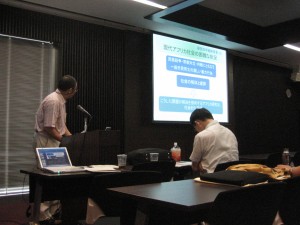
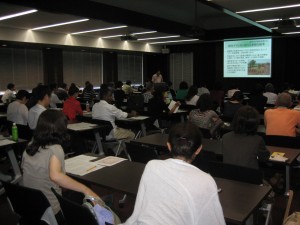
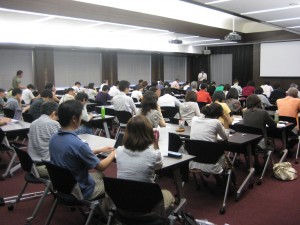
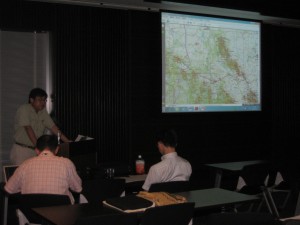
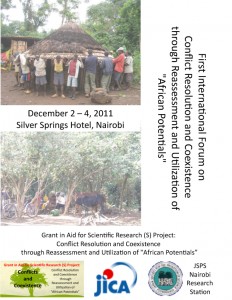
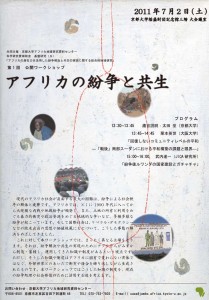

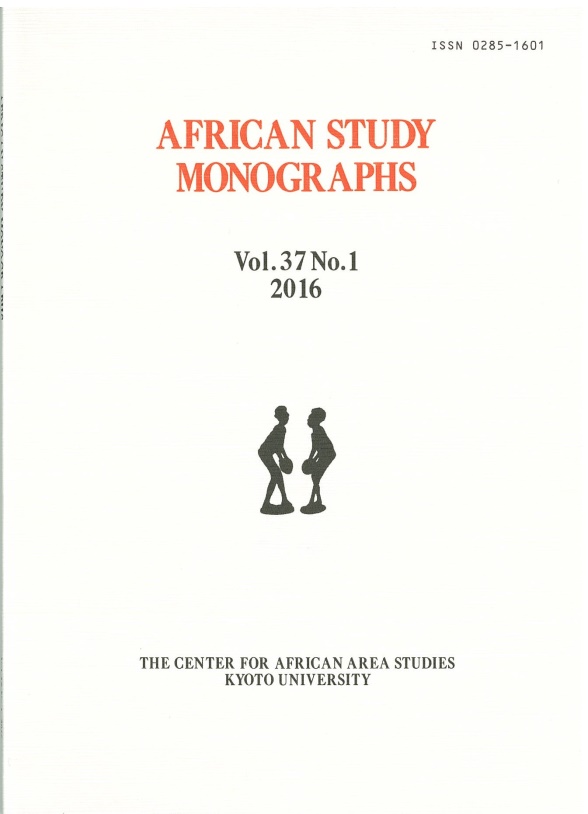
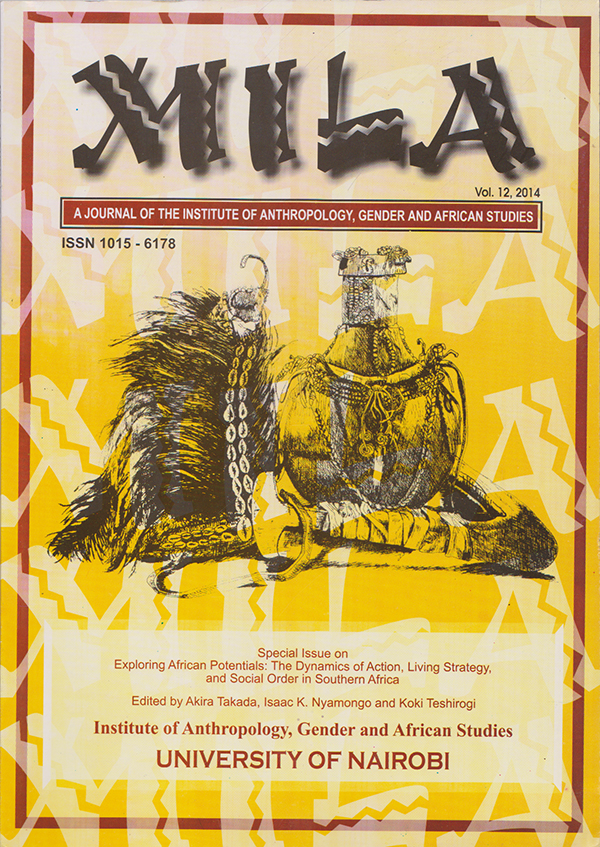 Exploring African Potentials, Mila Special Issue
Exploring African Potentials, Mila Special Issue